
The German siege of Stalingrad begins
WHEN PAULUS TRIED TO CONVINCE HITLER FOR SURRENDER...
In an attempt at dissuading Hitler from his insistence upon fighting to the bitter end, Paulus dispatched an aide, Major Coelestine von Witzewitz, to speak directly to Hitler and give him a first hand account of the dire situation of the men in the pocket. Although von Witzewitz was warmly welcomed by the Fuehrer, his attempt at recounting the horrors facing the soldiers of 6th Army was met with attempts to change the subject. Hitler spluttered nonsense about how the soldiers should hang on until relief arrived and that 6th Army's ordeal was tying down Soviet forces which might otherwise prevent the evacuation of the Army Group in the Caucasus.
With Hitler trying to evade the issue and Keitel glaring a warning at him not to take this any further, von Witzewitz was undeterred. With a temerity few higher ranking officers dared to display to the German dictator, von Witzewitz countered Hitler's instructions to fight to the last man and bullet by saying, "Mein Fuehrer, I can state that these men can no longer fight to the last bullet because they no longer have a last bullet!" Hitler mumbled something to the effect that, "Man recovers very quickly". With that statement the young officer was dismissed.
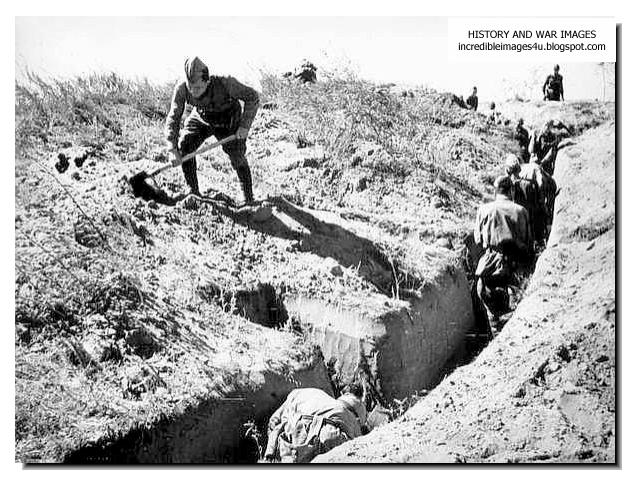 The Russians make defensive positions anticipating the German assault
The Russians make defensive positions anticipating the German assault
WHEN THE LAST GERMAN PLANE TOOK OFF FROM STALINGRAD...
Airlift operations struggled on until Jan. 24, 1943. Two Ju-52s managed to lumber off the runway at Pitomnik airfield, littering the surrounding countryside with an assortment of desperate men who tried to escape by clinging to the wings of the transport. Along with a handful of wounded and a few key staff officers, the last transport carried the War Diary of the 6th Army, Paulus' Last Will and Testament and a few personal keepsakes for his family. A short time after these planes left, a Soviet T-34 tank broke through the outer defense ring of the airfield and started shooting up the control tower and the makeshift airport facilities. Supported by more tanks and a horde of Russian infantry which soon followed, Pitomnik was now in the hands of the Red Army and the airlift came abruptly to a halt.

If Hitler had communicated in private to Paulus"A thousand years hence Germans will speak of this battle with reverence and awe, and that in spite of everything Gemany's ultimate victory was decided there... In years to come it will be said of the heroic battle on the Volga: When you come to Germany, say you have seen us lying at Stalingrad, as our honor and our leaders ordained that we should, for the greater glory of Germany!"
Apart from this bombastic tripe, Hitler had only one thing left to offer the doomed men of 6th Army. With an unprecedented show of generosity, he presented dozens of senior officers of 6th Army with promotions in rank, most notably a Field Marshal's baton for Friedrich Paulus. There was a cynical method to his madness, as Hitler mentioned to Gen. Zeitzler that in the entire history of the German Army no Field Marshal had ever surrendered or been captured alive. If he couldn't have the prize of the city that bore Stalin's name, he was determined to have a dead Field Marshal to offer up as a hero to the German Reich.
Paulus was not so accommodating as to throw himself on his own funeral pyre. The very next day, Soviet forces closed in on his last command post, a cellar in the bombed out ruins of the Univermag Department Store in downtown Stalingrad. Unshaven, dirty and close to a state of collapse, Friedrich Paulus offered his surrender to an obscure Russian Lieutenant named Fyodor Yelchenko, who promptly marched the new Field Marshal and his staff off to his superiors. Of the nearly 350,000 men who had followed him to Stalingrad, only 90,000 survived to surrender to the Soviets.
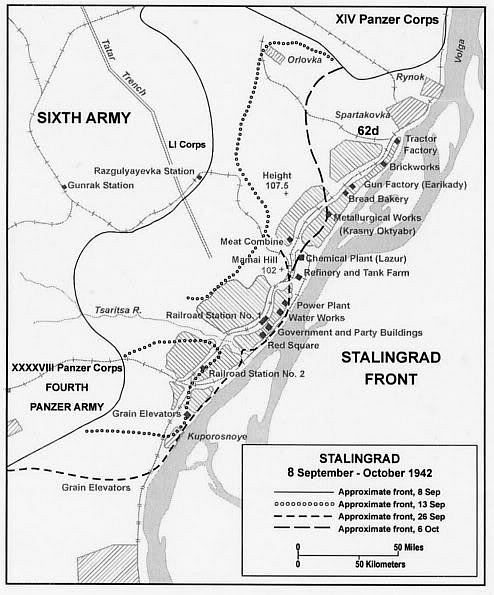
HOW THE HITLER GOVERNMENT TOOK THE NEWS OF PAULUS SURRENDER...
Stalin and Stavka waited a day until surrender arrangements were secure and it could be confirmed that Paulus was alive and in custody before the Soviet government proudly announced their incredible victory to an astonished world. With the Russian announcement of Paulus' surrender on Feb 1, Goebbels and his propaganda machine could no longer hide the truth. The following day, the German people were informed of the loss of the entire German 6th Army and a three day period of national mourning. Theaters, restaurants and all forms of entertainment in Germany were shut down as Hitler's subjects contemplated the reality that one of their elite armies had died in the field.
A sense of foreboding fell over the Reich as Goebbels indefatigable propaganda apparatus prepared them for the worst, including ultimate disaster in Russia. "We have thrown the national existence into the balance. There is no turning back". Adolf Hitler was a little more expressive, only much more private. At his Headquarters the apoplectic dictator raged to Gen. Zeitzler about the lack of character in the "Weakling" he had promoted to Field Marshal but who had failed to take the hint and commit suicide, as was only fitting. Hitler also speculated that Paulus might actually be dead in the ruins of the city someplace and that the Russians were lying about having captured him.
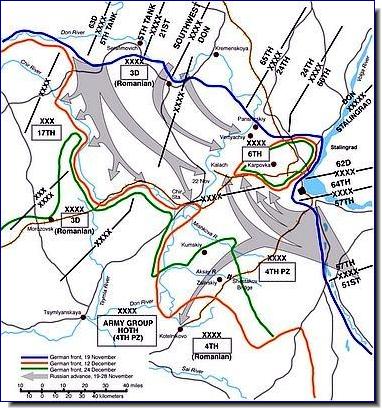
WHAT HAPPENED TO PAULUS AND HIS MEN AFTERWARDS?
Paulus was actually in warm and comfortable quarters in a suburb of Moscow, where he would remain until the end of the war. The soldiers of 6th Army who had been promised food and shelter by the Russians were not so fortunate. The Russians kept about 20,000 of them to remain as forced labor in Stalingrad to work at rebuilding the city they destroyed. The rest were dispatched to numerous POW camps scattered from Siberia to Soviet Central Asia. Many died shortly after the surrender from a Typhus epidemic brought about by Lice and the unsanitary conditions experienced during the battle. Many more died of malnutrition, disease and neglect in the various prison camps run by the Soviets. Of the 90,000 who surrendered with Paulus, only 5,000 men survived to return home to Germany. Many of these men were held captive the longest by the Russians, as their release wasn't finally secured by W. German Chancellor Konrad Adenauer until 1955.
Gen. Vasily Chuikov was deprived of the honor of taking Paulus into custody, and in fact the two principal adversaries of Stalingrad never had a chance to meet. But Chuikov and his 62nd Army received the highest honors the Red Army could bestow upon their soldiers. Renamed the 8th Guards Army for their heroic defense of the city, Chuikov led his men on a march across Europe which ultimately led to Berlin. His troops had the honor of capturing the Reichstag and planting the Hammer and Sickle flag on top of the building in the capitol of the Third Reich. After the war, Chuikov was promoted to Marshal of the Soviet Union. He commanded the prestigious Kiev Military District and later became a candidate member of the Politburo. Chuikov died in 1982.
Apart from going to Nuremberg to testify at the trial of the top German Generals, Paulus spent his last years in the Soviet occupation zone of E. Germany. He was given a house, aides, the honorific of being addressed as "Herr Generalfeldmarschall" and all deference in consideration of his rank while he was the permanent "guest" of the E. German Security Service. He never saw his wife Coco again. She had been arrested by the Nazis after he started making anti-Hitler broadcasts to Germany on behalf of the Soviet propaganda apparatus. She died in Bavaria in 1948. His son Alexander was killed in action at Anzio in 1944. Paulus spent much of his time writing long and rambling rebuttals to those who blamed him for the disaster at Stalingrad. He died in Dresden, E. Germany in 1957.

Russian soldiers rush to board their tanks. Stalingrad area
From the Soviet perspective, the significance of the struggle for Stalingrad carried implications far beyond the borders of the Soviet Union. It defined the major turning point of World War II in Europe. By halting the advance of one of Germany's elite armies and ultimately defeating it, the Russians proved that the Wehrmacht was not invincible. It gave the Soviet armed forces the confidence they would need and the skills required to ultimately defeat Nazi Germany. From beyond the horizons of European Russia, the road to the Soviet Union's claim as a legitimate Superpower began at the banks of the Volga.
Stalingrad also shattered the myth of Hitler's infallibility among the Germans themselves. Although it cannot be properly said that Stalingrad was the beginning of the German defeat in Russia, it certainly marked the end of German victories. After they comprehended the scope and scale of the disaster, several German officers were prompted to calculate exactly how they might bring and end to Hitler's rule. The nucleus of the Bomb Plot of July 20, 1944 was hatched in the ruins of the city by the Volga.
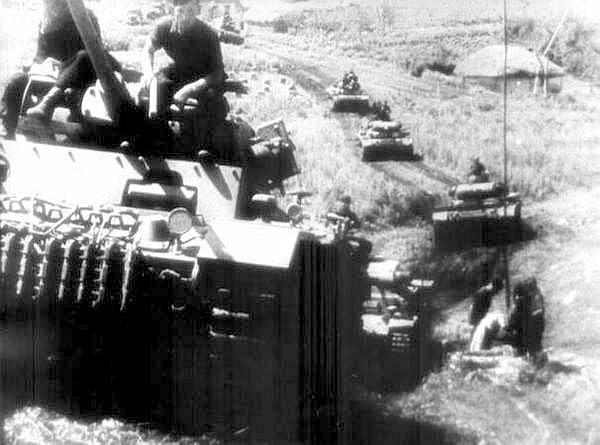
Even though everyone knew a German offensive was imminent, the Soviets were surprised when the offensive began in the south. This is because they had expected the Germans to continue the drive for the capital of Moscow. Tactically, this battle seemed to be an exact copy of the previous campaigns on the Eastern Front. The German Panzer divisions pushed forward hard and fast, and advanced deep into the Soviet lines. The infantry divisions followed on behind, mopping up what little resistance remained. But immediately there was a slight difference to this battle, a difference that would lead to one of the biggest misconceptions that was made during the war. Instead of the German pincers swinging around and trapping large numbers of Russian prisoners, the Soviet army was retreating in good order, always just ahead of any German trap. This led Hitler himself to assume that he was correct in believing that the Russian military was on its last legs and just needed one more big push to end it all. It was inconceivable to Hitler that the Soviet military had learned from previous mistakes and had gained experience in buying time with space. So only a short amount of time after the battle had begun, and only after the Sixth army had reached the outskirts of Stalingrad, Hitler ordered the armoured elements of the army in the south to begin the drive for Russian oil.

The fighting was fierce. For every inch....
HOW THE BATTLE PROGRESSED...
Despite being stripped of its armoured elements, the Sixth Army still had to capture the whole of the city. So it began the slow process of moving through the built up areas, street by street, and clearing out all resistance. However, to the surprise to the German high command, the Soviet forces began to stand up and fight for every scrap of land in the city. This change in orders had come from Stalin himself, who either did not want the city named after him to fall under the control of the Nazi invader or recognised an opportunity to draw the Germans into a trap. The small numbers of armoured elements the Germans had could not be brought to bear in the tight confines of a city, and so the conflict was reduced to an infantry battle; one where the front line was at best a street, and at worst little more than rooms or even floors of buildings. Even the sewers and basements were fought over bitterly.
The toughest fighting could be found around important sites and buildings, a mythical status now grew about them. These buildings included the towering Grain Store and the Red October Tractor Factory. At the height of the fighting, the tanks that were being built in the factory rolled straight out and into the thick of action, unpainted and with the factory workers themselves manning the tanks. Soon, the battle for the city took on a life of its own, drawing the attention of both Hitler, obsessed with its capture and Stalin, obsessed with its defence. Yet it was Hitler who became too drawn in, which led him to ignore the coming of colder weather and the obvious build-up of the Russian reserves.
As another Russian winter approached, Germans found themselves in control of nine-tenths of Stalingrad, while the Russians held a strip of land on the western bank of the Volga. The German soldiers could almost see the light at the end of the tunnel. Yet, what the Germans did not know was that the Russians had already begun the build-up of their forces for a counter-offensive. The Soviet war industry was now going at full steam and producing vast amounts of arms and equipment, but instead of sending these resources straight into the battle for Stalingrad, the Soviet high command sent only enough to maintain the foothold on the western bank.
German soldiers move past a destroyed T-34 tank cautiously in October, 1942. A Soviet sniper or a Soviet scout could be lurking round the corner.
The rest of the forces were amassing on either side of the Germans inside Stalingrad, with the intention of breaking through and trapping the German Sixth Army inside the city. Opposite these forces, protecting the German flanks, was a Romanian army to the north and a Bulgarian army to the south. These were not third-rate forces, as the Germans claimed after the battle, but they were not as good as the German forces and lacked any real ability to defend against armoured forces. The Russians knew this and planned to smash through these weaker forces with their new tanks.

Street fighting in Stalingrad
HITLER LISTENED TO GOERING.....
The Russians unleashed their counter-offensive just as the snows began to fall, using the now hardened ground to help their armoured fists break through the shocked Axis forces. The Germans were taken completely by surprise, and after a short time the two Soviet drives had met up and the Sixth Army were surrounded in Stalingrad. The German army were far from totally trapped; in fact, if the Sixth Army had been ordered to break out west, the Russian army would have had difficulty in stopping them. Yet it was at this time that Hitler made another mistake, dooming the thousands of German soldiers inside the city. Listening to the ever boastful Goering, and still obsessed with Stalingrad's capture, he ordered the Sixth Army to continue fighting for the city while they were re-supplied by the planes of Goering's Luftwaffe.
This was not a totally unreasonable plan. During the previous year the Luftwaffe had successfully maintained an air bridge to trapped German forces after another Soviet counter-offensive. The problem with this assumption is that the circumstances surrounded these situations were slightly different. The Luftwaffe had previously re-supplied a brigade-sized force, over a short distance during good weather, and allowed the trapped forces to be rescued by ground forces. Now they had to re-supply an army group, over a longer distance, during the dead of a Russian winter. The German aircrews were given an almost impossible task, and during the months that followed they never once met the daily quotas of supplies needed to keep the soldiers alive, let alone fighting
A HELL CALLED STALINGRAD
There was a saying among the soldiers of the Sixth Army that they no longer feared death, as hell could not be any worse they what they were enduring in Stalingrad. In the months that followed the encirclement, it's easy to understand why. With the trapped German forces safely secured in Stalingrad, the Soviets were not just content to let them slowly starve to death. They continued the offensive west, as they simultaneously started to drive into the city and begin its liberation. So with the terrible fighting of the previous autumn returning, the Russian winter and the continued reduction in supplies, the German high command began begging Hitler to give permission for the Sixth Army to break out. However, Hitler refused to listen to his generals, and instead ordered some of the German armoured forces north, away from the oil fields in order to link up with the trapped German army. Initially, this appeared to work, especially if the Sixth Army had then been ordered to break out when the German Panzers had stalled in their attack. But yet again, Hitler would not listen to generals and refused to give an inch of the city back the to Soviets.
With the momentum of this attack completely stalled some distance from the besieged Sixth Army, all hope for the German soldiers in Stalingrad was extinguished. The final nail in the coffin was when two of the three German-controlled airfields in Stalingrad fell to the Soviets. This finally ended all pretence of the air re-supply operation being effective. The soldiers were now surviving on a few scraps of black bread with some butter, with perhaps a very rare piece of meat or cheese - far below the rations required for survival throughout a bitter winter. The German doctors then began to notice men dying of a strange illness that none of them had seen before; it turned out to be malnutrrition. Yet even after all of this, the fighting and the torment continued, and the soldiers were ordered to fight to the bitter end. The commander of the Sixth Army, General Von Paulus, was even made a Field Marshal by Hitler, and reminded that no German Field Marshal had ever been captured alive. However, their sacrifice may not have been completely in vain, since there was a military justification for the city holding out. The German forces that had been ordered south of the city, to the oil fields, had now been ordered to retreat before they were cut off. The troops in Stalingrad therefore pinned down the Soviets in order to prevent this.
Yet however noble their sacrifice or important their struggle, no army could endure the conditions suffered by the men of Stalingrad for long. By the time the German public heard a Christmas radio message from Stalingrad, the city had already fallen; the message was faked for propaganda purposes. Field Marshal Paulus surrendered at Stalingrad in order to save the lives of himself and his men. Still, perhaps they would have fought to the bitter end if he and the 600,000 captured men of the Sixth Army had known that only 5,000 of them would survive their capture and see Germany again after the war. This was the final ironic twist, bringing to a close the horrors of the battle for Stalingrad.
The people of Stalingrad clean up the rubble resulting from German bombardment
WHY WERE THE GERMANS SO DESPERATE TO WIN STALINGRAD?
Oil. Stalingrad was the gateway to the Caucasian oilfields. Hitler wanted oil to fuel his war. If the Russians had failed to hold onto Stalingrad, they would have lost a major oil-producing region. The Germans could have move further into mid-Asia and linked up with Rommel's forces in Africa. Also Stalingrad was a major industrial area and vital communication center. It was in the way of the link between the sea-ports on the Black and Caspian Sea and Northern Russia. Occupying Stalingrad would have meant Russia would lose that route for vital war supplies.
A Russian anti-aircraft gun fires at Luftwaffe fighters in Stalingrad
In July 1942 the Germans were better equipped than the Russians
Troops 187000 (German) 250000 (Russian)
Guns and mortars 7900 (G) 7500 (R)
Tanks 360 (G) 740 (R)
Aircraft 337 (G) 1200 (R)
General Paulus, commanding officer of the German Sixth Army, surveys the battlefield. Northern Stalingrad area
Before the battle there were 8,50,00 inhabitants in Stalingrad. In February 1943 when the battle ended there were only Russian people in the city.
The people of Stalingrad had a rough time during the battle. Stalin did not let them leave the city as the large scale evacuation would be distracting to the war effort. The Germans acted very brutally with the civilians in the occupied parts of the city.
Withdrawing was not a option either for a German or Russian soldier. Hitler and Stalin had given orders to shoot deserters.
The Germans had starting bombarding Stalingrad from the air the moment the siege started but the worst bombing occurred on August 23, 1942 when a Dresden-like firestorm was created by the heavy bombing. Stalingrad turned into a city of ruins.
German tanks trundle towards Stalingrad
German warplanes dropped 1000 tons of bombs on the city to soften the Russian resistance
The average life-expectancy of a Russian soldier in Stalingrad was 24 hours
With the Germans controlling almost nine-tenths of the city at one time, the Russians had to cross the Volga river to reach the city. Many soldiers drowned in the river while trying to cross it as their arms and rations weighed them down.
Stalin had forbidden any Russian civilian from leaving the city. Not even a child.
The Russian anti-aircraft artillery (1077th Artillery) was manned by Russian women. The Germans were surprised when they learnt they were fighting with women.
German soldiers, red-eyed with exhaustion from the hard fighting,and mourning more comrades than they ever imagined, had lost the triumphalist mood of just a week before. Everything seemed disturbingly different. They found artillery fire far more frightening in a city. The shell burst itself was not the only danger. Whenever a
tall building was hit, shrapnel and masonry showered from above.The Landser had already started to lose track of time in this alien world, with its destroyed landscape of ruins and rubble. Even the midday light had a strange, ghostly quality from the constant haze of dust.
A German mortar on the approach to the Volga
Russian political prisoners were sent on suicide missions in Stalingrad so that they could atone their 'sins'.
The German soldiers were in for a rude shock in Stalingrad. They had never encountered fighting at such close quarters. Hand-to-hand fighting. The enemy was just a few yards away. Building. Street. Drains. The fighting was fierce. For every inch. For German soldiers, used to the relatively 'easier' Blitzkrieg, found Stalingrad a nightmare.
The River Volga burns. Stalingrad area
The fighting in Stalingrad was the most primeval. Lust for blood was the mantra for survival. Kill. And kill. Man was at his beastliest in Stalingrad.
Noise assailed their nerves constantly. 'The air is filled', wrote a panzer officer, 'with the infernal howling of diving Stukas, the thunder of flak and artillery, the roar of engines, the rattle of tank tracks, the shriek of the launcher and Stalin organ, the chatter of sub-machineguns back and forth, and all the time one feels the heat of a city burning at every point.' The screams of the wounded affected men most. 'It's not a human sound,' one German wrote in his diary, 'just the dull cry of suffering of a wild animal.'
A Russian T-34 stands on a road in devastated Stalingrad
PAGES FROM THE PERSONAL DIARY OF WILHELM ADAM, ASSISTANT TO FIELD MARSHAL PAULUS
'I was pacing my little room nervously, three steps forward three steps back. I couldn't get that map with all its markings out of my head. The red arrows indicating the advance of the Russians from the North and South haunted me. I could almost see them closing in at Kalach. My God. What would happen then. Would the panzers arrive in time to prevent the encirclement of the sixth army? What would the next few hours bring? The answer came sooner than I expected. Paulus summoned me to his room. It was thick with tobacco smoke and the ash tray on the table was overflowing. Next to it stood an unfinished cup of black coffee. The Commander-in-Chief was lighting another cigarette. 'As you know, Adam, the 14th Armoured Division suffered heavy losses in the defence fighting. The Russians have almost wiped out the Artillery Regiment. Now the Divisional Commander, General Bessler, has reported sick. Looks like his old heart trouble again. He asked me to help get him sent back home. I agreed. I've no time for a commander who reports sick at a time like this. He'd only be in the way. ' But it's desertion' I said. 'He's a coward. I don't believe he's ill. Afraid of parting with his precious life.' 'That's the concern of the Army operations group. I've sent them a report. General Bessler was in such a hurry that he'll soon be there.
Death Road: I was summoned by HQ Commander Major-General Schmidt. 'Adam, set up the command post in the new position.' I ordered the car to be got ready. On January 13th, just before 9.00 in the morning, I set out. We were still in control of a short stretch of highway. On it was an endless stream of retreating soldiers and before I had covered even one kilometre my car was filled with wounded. Two stood on the running board. 'Drive slower' I told the driver who was afraid the springs might break under the load. I decided to make a small detour to deliver the wounded to hospital. Though my car was packed, we stopped to pick up one more wounded soldier. I had already noticed him from a distance. He was standing by the road, his blanket-wrapped arm raised in entreaty. As we approached I was struck by his child-like eyes, which expressed utter despair. Tears were running down his cheeks. I thought of my son and ordered the car to halt. The poor boy stumbled towards us with great difficulty. ' I beg you, sir' he said, ' take me to Stalingrad'. I moved closer to the driver and sat the soldier next to me. The lad wasn't yet nineteen. His hands and feet were frostbitten. He had been standing on the road for nearly an hour but nobody had taken any pity on him. He didn't know how to thank me and several times tried to shake my hand. To him Stalingrad meant safety and life. I unloaded the wounded at the hospital in the western part of the city. The young fellow had to be carried in.
The highway was covered with bodies. While walking to the city the wounded and the sick would become exhausted, sit down on the road, fall asleep and freeze to death. No one removed the bodies. Tanks and trucks rode over them, rolling them into shapeless, flat cakes. Drivers and passers-by looked at them stupidly and with indifference. This stretch was called 'Death Road'. Here also was the wreckage of hundred upon hundred of cars, trucks and buses that had been destroyed by bombs. Among them were wrecked tanks and artillery pieces. Here and there were blackened fragments of burned bombers. Along the road were countless numbers of undamaged cars standing motionless, needing only one thing - fuel.
Meeting The Victors: January 31, 1943 - 7.00 a.m. It was still dark but day was dawning almost imperceptibly. Paulus was asleep. It was some time before I could break out of the maze of thoughts and strange dreams that depressed me so greatly. But I don't think I remained in this state for very long. I was going to get up quietly when someone knocked at the door. Paulus awoke and sat up. It was the HQ Commander. He handed the Colonel General a piece of paper and said: 'Congratulations. The rank of Field-Marshall has been conferred upon you. The dispatch came early this morning - it was the last one.'
'One can't help feeling it's an invitation to suicide. However I'm not going to do them such a favour.' said Paulus after reading the dispatch. Schmidt continued: 'At the same time I have to inform you that the Russians are at the door.' with these words he opened the door and a Soviet General and his interpreter entered the room. The General announced that we were his prisoners. I placed my revolver on the table.
'Prepare yourself for departure. We shall be back for you at 9.00. You will go in your personal car.' said the Soviet General through his interpreter. Then they left the room. I had the official seal with me. I prepared for my last official duty. I recorded Paulus's new rank in his military document, stamped it with the seal then threw the seal into the glowing fire.
The main entrance to the cellar was closed and guarded by the Soviet soldiers. An officer, the head of the guards, allowed me and the driver to go out and get the car ready. Climbing out of the cellar, I stood dumbfounded. Soviet and German soldiers, who just a few hours earlier had been shooting at one another, now stood quietly together in the yard. They were all armed, some with weapons in their hands, some with them over their shoulders.
My God, what a contrast between the two sides! The German soldiers, ragged and in light coats, looked like ghosts with hollow, unshaven cheeks. The Red Army fighters looked fresh and wore warm winter uniforms. Involuntarily I remembered the chain of unfortunate events which had prevented me from sleeping for so many nights. The appearance of the Red Army soldiers seemed symbolic. At 9.00 sharp the HQ Commander of the 64th Army arrived to take the Commander of the vanquished German 6th Army and its staff towards the rear. The march towards the Volga had ended."
The Germans bombed a Russian fuel depot
German infantrymen loathed house-to-house fighting. They found such close-quarter combat, which broke conventional military boundaries and dimensions, psychologically disorientating. During the last phase of the September battles, both sides had struggled to take a large brick warehouse on the Volga bank, near the mouth of the Tsaritsa, which had four floors on the river side and three on the landward. At one point, it was 'like a layered cake' with Germans on the top floor, Russians below them, and more Germans underneath them. Often an enemy was unrecognizable, with every uniform impregnated by the same dun-coloured dust.
German soldiers in action at Stalingrad
STALINGRAD LIKE BATTLE OF VERDUN?
German generals do not seem to have imagined what awaited their divisions in the ruined city. They lost their great Blitzkrieg advantages and were in many ways thrown back to First World War techniques, even though their military theorists had argued that trench warfare had been 'an aberration in the art of war'.
The Sixth Army, for example, found itself having to respond to Soviet tactics by reinventing the 'storm-wedges' introduced in January 1918: assault groups often men armed with a machine-gun, light mortar and flame-throwers for clearing bunkers, cellars and sewers. In its way, the fighting in Stalingrad was even more terrifying than the impersonal slaughter at Verdun. The close-quarter combat inruined buildings, bunkers, cellars and sewers was soon dubbed Rattenkrieg' by German soldiers. It possessed a savage intimacy which appalled their generals, who felt that they were rapidly losing control over events.
'The enemy is invisible,' wrote General Strecker to a friend. 'Ambushes out of basements, wall remnants, hidden bunkers and factory ruins produce heavy casualties among our troops.' German commanders openly admitted the Russian expertise at camouflage, but few acknowledged that it was their aircraft which had produced the ideal conditions for the defenders. 'Not a house is left standing,' a lieutenant wrote home, 'there is only a burnt-out wasteland, a wilderness of rubble and ruins which is well-nigh impassable.'
At the southern end of the city, the Luftwaffe liaison officer with 24th Panzer Division wrote: 'The defenders have concentrated and fortified themselves in the sections of the town facing our attacks. In parkland, there are tanks or just tank turrets dug-in, and anti-tank guns concealed in the cellars make it very hard going for our advancing tanks.'
The German soldier is carrying a 5cm leichter Granatenwerfer 36 (5 cm leGrW 36) on his left shoulder
A more general tactic evolved, based on the realization that the German armies were short of reserves. Chuikov ordered an emphasis on night attacks, mainly for the practical reason that the Luftwaffe could not react to them, but also because he was convinced that the Germans were more frightened during the hours of darkness, and would become exhausted.
The German Landser came to harbour a special fear of the Siberians from Colonel Batyuk's 284th Rifle Division, who were considered to be natural hunters of any sort of prey. 'If only you could understand what terror is,' a German soldier wrote in a letter captured by the Russians. 'At the slightest rustle, I pull the trigger and fire off tracer bullets in bursts from the machine-gun.' The compulsion to shoot at anything that moved at night, often setting off fusillades from equally nervous sentries down a whole sector, undoubtedly contributed to the German expenditure of over 25 million rounds during the month of September alone.
The Russians also kept up the tension by firing flares into the night sky from time to time to give the impression of an imminent attack. Red Army aviation, partly to avoid the Messerschmitts by day, kept up a relentless series of raids every night on German positions. It also served as another part of the wearing-down process to exhaust the Germans and stretch their nerves.
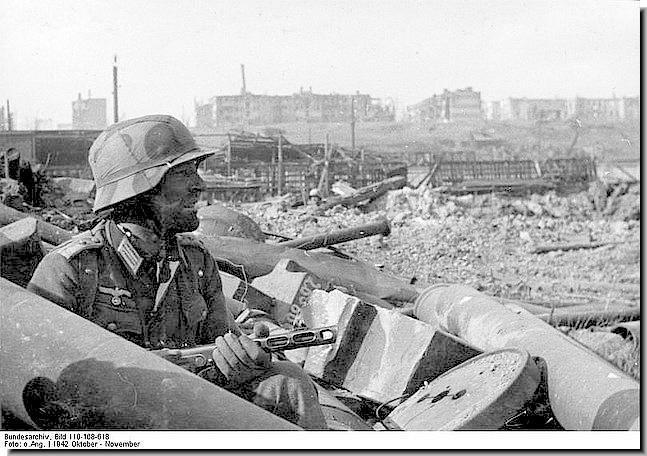
A German officer occupying a ramshackle fortified position in Stalingrad Oct-Nov 1942. He is armed with the Soviet PPSh-41 submachine gun,a robust weapon ideal for fighting in urban area
THE HARD WAR
German medical authorities tended to use the euphemism of 'exhaustion', like the British, but their prescription was closer to the brutal simplicity of the Red Army. The German Army had refused even to acknowledge its existence. In 1926, nearly seven years before Hitler took power, war neurosis was simply abolished as a condition along with the pension that had gone with it. Take away the disease, went the argument, and you take away the reason for leaving the front line. Breakdown was classified as cowardice, and therefore could be a capital offence. It is thus impossible to say what proportion of disciplinary offences on either side at Stalingrad, especially desertion, was caused by battle shock and general strain.
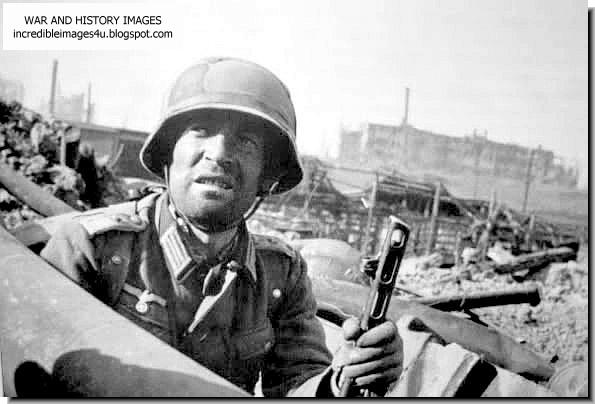
Chuikov soon recognized that the key infantry weapons in Stalingrad would be the sub-machine-gun, the grenade and the sniper's rifle.
Now the Russians at Stalingrad....
HOW THE RUSSIANS DEALT WITH THE STUKA DIVE BOMBERS
The real anti-aircraft batteries also amended their tactics. The Stukas came over at an altitude of between 4,000 and 5,000 feet, then half-rolled to drop into a dive at an angle of about seventy degrees, their siren screaming. They came out of the dive at just under 2,000 feet. Anti-aircraft gunners learned to put up a curtain of fire to hit them either at the point of going into the dive, or at the point of coming out. Shooting at them on the way down was a waste of ammunition.
This Russian unit is waiting for German planes
Supplying forward positions with food was a constant problem. An anti-tank detachment had a Kazan Tartar cook who filled a large army thermos with tea or soup, fastened it to his back and crawled up to the front-line positions under fire. If the thermos was hit by shrapnel or bullets, the hapless cook was soaked. Later, when the frosts became really hard, the soup or tea froze and he was 'covered in icicles by the time he got back'.
One Russian soldier has a drink, another has a bite to eat while a third reads a book. The fourth stands guard clutching his machine-gun on the lookout for any German activity
Feeling braver in the daylight, the Germans shouted insults and threats from their front lines: 'Russkies! Your time has come!' or iHei, Rus, bul-bul, sdavaisa!\ their pidgin Russian for: 'Surrender or you'll be blowing bubbles!' The notion of pushing Soviet troops back into the Volga, where they would drown like a stampeding herd, became a constant refrain.
RUSSIAN SOLDIERS: SMOKE AND DRINK
Russian soldiers smoked constantly in battle. 'It's permissible to smoke in action,' an anti-tank rifleman told Simonov, 'what's not permissible is to miss your target. Miss it just once and you'll never light up again.'
Even more important than tobacco was the vodka ration, theoretically 100 grams a day. Men fell silent when the vodka was produced, everyone eyeing the bottle. The strain of battle was so great that the ration was never considered enough, and soldiers were prepared to go to desperate lengths to meet their need. Surgical spirit was seldom used for its official purpose. Industrial alcohol and even anti-freeze were drunk after being passed through the activated carbon filter of a gas mask. Many soldiers had thrown their gas masks away during the retreats of the previous year, so those who had held on to them could bargain. The result could be much worse than just a bad headache. Most recovered because they were young and healthy and did not resort to it frequently, but those who tried too often went blind.

During the first week of October, Chuikov clearly had started to wonder whether they would be able to hold the rapidly narrowing strip of river bank. Everything depended on the Volga crossing. He knew that his badly mauled regiments had inflicted heavy casualties on the Germans, but the outcome of the battle depended on nerve as much as resources. They had no alternative but to stick with the 62nd Army's slogan: 'For the defenders of Stalingrad there is no ground on the other side of the Volga.' This really had become a sacred oath for many soldiers.
--------
The Soviet authorities were pitiless. 'In the blazing city,' wrote Chuikov, 'we did not suffer cowards, we had no room for them.' Soldiers and civilians alike were warned with Stalin's quotation from Lenin: 'Those who do not assist the Red Army in every way, and do not support its order and discipline, are traitors and must be killed without pity.' All 'sentimentalism' was rejected.


A German assault unit gets the briefing
AERIAL FIGHT OVER STALINGRAD
Aerial dogfights over the Don during those last days of July and early August attracted the attention of the whole battlefield below.German infantrymen and panzer crews alike would shade their eyes with a hand against the sun, peering up at the blue sky and vapour trails. Russian aircraft generally attacked ground targets at midday.It was such a regular run that Messerschmitt 109s would often make sure that they were around, ready to jump them. There were cheers whenever an enemy machine was hit, and the stricken aircraft, pouring smoke, corkscrewed down and exploded on the ground. The reputation of star fighter pilots began to grow within the German Army as well as the Luftwaffe.

A German officer and a non-commissioned officer, armed with pistols, machine guns, MR40, lead a street fight
WHY HITLER LOST AT STALINGRAD
The majority of Russian soldiers seem to have subsumed their personal feelings within the cause of the Great Patriotic War. They may have been more afraid of the censor than their German counter-parts; they may have been more effectively brainwashed by the Stalinist regime, and yet the concept of self-sacrifice comes across as much more than an ideological slogan. It appears almost atavistic, a moral compulsion in the face of the invader. 'People might reproach me',wrote a Red Army lieutenant in Stalingrad to his bride of a few weeks, 'if they read this letter about the reason why I am fighting for you.But I can't distinguish where you end, and where the Motherland begins. You and it are the same for me.'

Luftwaffe troops securing areas recently overran by Soviet troops, Stalingrad, 22 October 1942
THE FAMOUS RUSSIAN SNIPER
The most famous sniper of them all, although not the highest scorer, was Zaitsev in Batyuk's division, who, during the October Revolution celebrations, raised his tally of kills to 149 Germans. (Hehad promised to achieve 150, but was one short.) The highest scorer,identified only as 'Zikan', killed 224 Germans by 20 November. Forthe 62nd Army, the taciturn Zaitsev, a shepherd from the foothills of the Urals, represented much more than any sporting hero. News of further additions to his score passed from mouth to mouth along the front.Zaitsev, whose name means hare in Russian, was put in charge of training young snipers, and his pupils became known aszaichata, or 'leverets'. This was the start of the 'sniper movement' in the62nd Army. Conferences were arranged to spread the doctrine of 'sniperism', and exchange ideas on technique. The Don and South-West Fronts took up the 'sniper movement', and produced their starshots, such as Sergeant Passar of 21st Army. Especially proud of his head shots, he was credited with 103 kills.

THE GERMANS WERE FALLING ILL.........
Regimental doctors began to be increasingly concerned about the general health of troops at this time. When the medical obituary of the Sixth Army was debated in Berlin by consultants late the next January, they charted a vertiginous rate of increase in the death ratefrom infectious diseases, dysentery, typhus, and paratyphus.had started to mount rapidly from as early as July.Although the total number of sick was roughly the same as the previous year, the Berlin specialists were astounded to establish thatfive times as many soldiers were succumbing.The Russians themselves had noticed the number of ill Germans with surprise and spoken of a 'German sickness'. The doctors in Berlin could only speculate that 'the troops' reduced resistance' had been due to cumulative stress, and short rations. The most vulnerable appear to have been the youngest soldiers, those aged between seven-teen and twenty-two. They alone accounted for 55 per cent of these deaths. Whatever the exact causes, there can be no doubt that the health of the Sixth Army was already a matter of serious concern inearly November, when the worst prospect appeared to be no morethan yet another winter in bunkers under the snow.

The most striking aspect of this period was the apparent assumption by Paulus and Schmidt that, once Sixth Army staff had passed back their reports, nothing more could be done since the threatened sectors were outside their area of responsibility. This passivity was entirely contrary to the Prussian tradition, which regarded inactivity, waiting for orders and failing to think for yourself as unforgivable in a commander. Hitler, of course, had set out to crush such independence in his generals, and Paulus, who was by nature more of a staff officer than a field commander, had acceded. Paulus has often been blamed for not disobeying Hitler later, once the scale of the disaster was clear, but his real failure as a commander was his failure to prepare to face the threat. It was his own army which was threatened. All he needed to do was to withdraw most of his tanks from the wasteful battle in the city to prepare a strong mechanized force ready to react rapidly. Supply and ammunition dumps should have been reorganized to ensure that their vehicles were kept ready to move at short notice. This comparatively small degree of preparation — and disobedience to Führer headquarters -would have left the Sixth Army in a position to defend itself effectively at the crucial moment
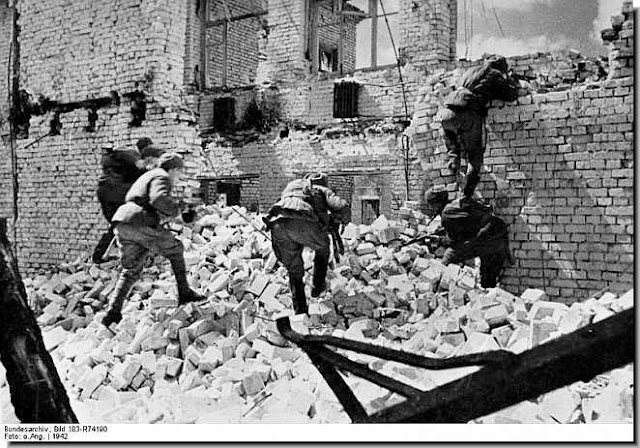
During the Soviet counter-offensive in November 1942 over 300 000 men were thrown into battle. Here Red Army soldiers and an assault group fight for the ruins of Stalingrad.
THE GERMANS AT STALINGRAD WERE ENCIRCLED
News spread rapidly on the German side, with the phrase, 'We're surrounded!' That Sunday, 22 November, was for Protestants the day of remembrance of the dead. 'A sombre Totensonntag 1942,'wrote Kurt Reuber, a priest serving as a doctor with 16th Panzer Division, 'worry, fear and horror.' Many, however, were not too concerned on first hearing the news. Encirclements had happened the winter before, and been broken, but better-informed officers, on further reflection, began to realize that this time there were no reserves to rescue them quickly. 'We became very much aware of what danger we were in', remembered Freytag-Loringhoven, 'to be cut off so deep into Russia on the edge of Asia.'
THE GERMANS WERE STARVING AND DYING....
Girgensohn, who spent seven years in Russian labour camps after the surrender, never lost his interest in the subject. He has always vigorously disputed any suggestion of 'stress illness', both as a con-dition in itself, and as an explanation for many of the unexplained deaths, even though recent research, which has shown that rats deprived of sleep for three weeks will die, suggests that humans deprived of sleep burn out rapidly. The pattern of Russian night attacks and constant activity to allow no rest undoubtedly had a contributory effect, as he acknowledges. But his explanation, after all these years, is more complex. He became convinced that the combination of exhaustion, stress and cold gravely upset the meta-bolism of most soldiers. This meant that even if they received the equivalent of, say, 500 calories a day, their bodies absorbed only a fraction. Thus, one could say that Soviet tactics, combined with the weather conditions and food shortages, produced, or at least contributed to, an accelerated process of starvation

Perhaps the best indication of officer pessimism was the secret decision to send out all German nurses, even before most of the wounded, to ensure that they never fell into Russian hands. Although great efforts were made to keep this secret, officers from the 369th Croat Infantry Regiment heard and lobbied the Luftwaffe to fly out their mistresses, disguised as nurses. The lieutenant whom they approached rather admired the Croats as soldiers and promised to help. His colonel, however, took a high moral line. 'But surely it doesn't matter', the lieutenant replied, 'whether they're Croat whores, nursing sisters or whatever. They must be got out to save them from the Rus- sians.' The colonel still refused. The lieutenant later suspected that the Croats managed to smuggle their women on to planes.

The Russians, despite all their air activity over the Kessel, still did not realize how large a force they had surrounded. Colonel Vinogradov, the chief of Red Army intelligence at Don Front headquarters, esti- mated that Operation Uranus had trapped around 86,000 men. The probable figure, including allies and Hiwis, was nearly three and a half times greater: close to 290,000 men. The allies included the remnants of two Romanian divisions, the Croat regiment with 100th Jäger Division and a motor-transport column of Italians who had picked a bad moment to come to find wood in the ruins of Stalingrad.

Many soldiers had still not received proper winter clothing before the encirclement, so they resorted to improvisation with varying degrees of success. Under their uniforms, more and more of them wore articles of Soviet uniform - button less tunic shirts and baggy quilted trousers and the highly prized quilted jackets. In hard frosts, a steel helmet became like a freezer compartment, so they wore puttees, scarves and even Russian foot bandages wrapped round their heads as insulation. Their desperation for fur gloves led them to kill stray dogs and skin them. Some even tried to make tunics out of amateurishly cured horse hide from the knacker, but most of these articles were uncomfortably crude, unless a former saddler or cobbler could be bribed to help.

A Russian KV-1 tank
Red Army soldiers now took a predictable pleasure in taunting the enemy who had so recently taunted them. Some companies sent out a patrol at night with a scarecrow dressed up as Hitler. They then erected it in no man's land, and hung a placard inviting Landsers to shoot at it. The scarecrow would be booby-trapped with a couple of grenades, in case a German officer sent out a patrol to remove it the next night. On a more organized basis, NKVD propaganda companies set up their loudspeakers. For hours on end, the loudspeakers blasted out tango music, which was judged to convey a suitably sinister mood, interspersed by messages prepared on gramophone records to remind the beleaguered troops of their hopeless position. At first, these activities had little influence, but later, when German hopes began to fade, the effect became cumulative.

Two Russian soldiers with a captured German machine gun MG-34. On the right is the former owner of the gun; a dead German soldier
The strain on Luftwaffe aircrew was intense.'Young and inexperi- enced aircrews were badly shaken' by the sights at Pitomnik, above all the miserable condition of the wounded waiting by the side of the runway for evacuation, and the piles of frozen corpses, left by the field hospital there because the ground was frozen too hard to bury them.

Speer's parents had recently rung him in panic. They had just heard that their youngest son Ernst was lying in 'a primitive field hospital' in a stable, 'only partly roofed and without walls' suffering from jaundice with fever, swollen legs and kidney pains. Speer's mother sobbed on the telephone: 'You can't do this to him.' And his father said: 'It's impossible that you, you of all people, can't do something to get him out.' Speer's sense of helplessness and guilt was compounded by the fact that the year before, following Hitler's order that senior officials must not use influence on behalf of relatives, he had fobbed off his brother with a promise to get him transferred to France once the campaign was over. Now the last letter from Ernst in Stalingrad said that he could not stand watching his fellow patients die in the field hospital. He had rejoined his comrades in the front line, despite his grotesquely swollen limbs and pathetic weakness.

It is impossible to assess the numbers of suicides or deaths resulting from battle stress. Examples in other armies, as already mentioned, rise dramatically when soldiers are cut off, and no army was more beleaguered than the Sixth Army at Stalingrad. Men raved wildly in their bunks, some lay there howling. Many, during a manic burst of activity, had to be overpowered or knocked senseless by their com- rades. Some soldiers feared breakdown and madness in others as if it were contagious.
A battle-hardened German soldier at Stalingrad. November 1942
German soldiers started to take great risks, venturing forward into no man's land to search the corpses of Russian soldiers for a crust of bread or a bag of dried peas, which they would boil in water. Their greatest hope was to find a twist of paper containing salt, for which their bodies ached. The hunger pains of German soldiers in theK essel were indeed bad, but others suffered far more. The 3,500 Russian prisoners of war in the camps at Voroponovo and Gumrak were dying at a rapidly accelerating rate. Several German officers were deeply shocked to discover during January that these prisoners were reduced to cannibal- ism, and made verbal reports. When Russian troops reached the camps at the end of January, the Soviet authorities claimed that only twenty men remained alive out of the original 3,500.
A German tank moves in Stalingrad
Operation Koltso, or 'Ring', began early on Sunday,10 January. Rokossovsky and Voronov were at the headquarters of 65th Army when the order 'Fire!' was given over the radio at five past six, German time. Guns roared, bouncing on their chassis from the recoil.Katyusha rockets screamed into the sky leaving dense trails of smoke. The 7,000 field guns, launchers and mortars continued for fifty-five minutes in what Voronov described as 'an incessant rolling of thunder'. Black fountains appeared all over the snow-covered steppe, obliter- ating the white scene. The bombardment was so intense that Colonel Ignatov, an artillery commander, remarked with grim satisfaction: 'There are only two ways to escape from an onslaught of this character - either death or insanity.'
Evacuating wounded Russian soldiers
'For an hour, a hundred guns of various calibres and Stalin Organs fired away,' wrote a lieutenant in the same division. 'The bunker swayed continually under the bombardment. Then the Bolsheviks attacked in terrifying masses. Three waves of men rolled forward, never flinching. Red banners were borne aloft. Every fifty to a hundred yards there was a tank.'
German soldiers rest near a bakery. In the background is a medium German tank Panzer 3
As soon as the fighting was over, peasant women appeared as if from nowhere and rushed over to the German trenches to search for blankets, either for their own needs, or as currency. Erich Weinert, accompanying the advancing troops, saw Russian soldiers throwing the files off the backs of trucks captured at a headquarters so that they could use the vehicles themselves. 'Karpovka looks like an enormous jumble sale,' he wrote. But amid the chaos of abandoned and destroyed military material, he saw the results of the terrible opening bombardment.'The dead are lying, grotesquely twisted, their mouths and eyes still wide open with horror, frozen stiff, with their skulls torn open and their bowels hurled out, most of them with bandages on their hands and feet, still soaked with yellow anti-frostbite ointment.
Germans tow a medium artillery gun. October 12, 1942
The anger of Russian soldiers and officers was vented on their German prisoners, skeletal and lice-infested. Some were shot on the spot. Others died when they were marched off in small columns, and Soviet soldiers sprayed them with machine-gun fire. In one case, the wounded commander of a company forced a captured German officer to kneel before him in the snow, cried out the reasons why he was seeking revenge, then shot him.
Germans raise the Nazi flag in Stalingrad. A bit premature, one may say, on hindsight
During this stage of the retreat, German hopes of SS panzer divisions and air-landed reinforcements finally expired for most men. Officers knew that the Sixth Army was indeed doomed. 'Several commanders', recorded a doctor, 'came to us and begged for poison to commit suicide.' Doctors were also tempted by the idea of oblivion, but as soon as they considered it carefully, they knew that their duty was to stay with the wounded. Of the 600 doctors with the Sixth Army, none capable of working flew out.
The Russians won the battle. A Russian soldier waves the red flag January end, 1943
The Kessel would have collapsed far more rapidly if some men had not retained a hard core of belief in the cause for which they were fighting.A Luftwaffe sergeant with the 9th Flak Division wrote home: 'I am proud to number myself among the defenders of Stalingrad. Come what may, when it is time for me to die, I will have had the satisfaction of having taken part at the most eastern point of the great defensive battle on the Volga for my homeland, and given my life for our Führer and for the freedom of our nation.' Even at this late stage, most fighting units continued to show dogged resistance, and there were examples of outstanding courage.
Russian civilians. Stalingrad. September 1942
That night, Milch's staff received a signal from Sixth Army headquarters: 'Gum- rak airfield unusable from 22 January at 04.00 hours. At that time the new airfield of Stalingradsky will be clear for landing.' This was optimistic. The landing strip at Stalingradsky was incapable of taking large aircraft. General Paulus was by then entirely fatalistic, and almost certainly suffering from deep depression. A Luftwaffe major just returned from the Kessel reported to Field Marshal Milch that Paulus had told him: 'Whatever help arrives from now on will be too late. We have had it. Our men have no strength left.' When the major tried to brief him on the general situation to the west facing Army Group Don, he had replied: 'Dead men are no longer interested in military history.'
Russians shoot from a roof-top
The truth was that the Red Army, like the Wehrmacht, made little provision for enemy wounded. Reports that the 500 left behind in the field hospital at Gumrak in the care of two sick orderlies and a divisional chaplain were massacred are, however, inaccurate. The Red Army just left them to fend for themselves on 'water from snow and horse carcasses'. Those who survived were moved to the camp at Beketovka ten days later.
October 2, 1942. An aerial view of Stalingrad after German Stukas bombed the city
The spectacle of defeat grew more terrible the closer retreating soldiers came to Stalingrad. 'As far as the eye can see, lie soldiers crushed by tanks, helplessly moaning wounded, frozen corpses, vehicles abandoned through lack of fuel, blown-up guns and miscel- laneous equipment.' Meat had been hacked from the flanks of a dead horse beside the road. Men dreamed of coming across a parachute container, packed with supplies, but they had been either seized on landing, or lost in the snowfields.
German soldiers in action with a MG-34 machine-gun. September 23, 1942
Another wave of Russian infantry came at them. Gebele screamed to his surviving men to open fire again. A staff sergeant tried firing a light mortar, but the range was so short that the headwind made a couple of the bombs fall on their own positions. Eventually, having held out for seven hours, Gebele saw that a Russian flag had appeared on a water tower to their rear. They had been outflanked. He gathered the last survivors of his battalion, and led them back towards the centre of Stalingrad. Inside the city, they were shaken by the scenes of destruction and military collapse. 'It was bitterly cold,' wrote one of them, 'and surrounded by such chaos, it felt as if the world was coming to an end.'
An aerial view of Stalingrad in August 1942. This shot was taken from a German bomber and shows a railway station in the city in flames.
Whenever Luftwaffe planes flew over, men looked up longingly, and continued to stare at the sky well after the tiny dot had disappeared. 'With heavy hearts', wrote one soldier, 'we gazed after the German aircraft and thought how wonderful it would be to be able to fly away, out of this inferno in which we had been abandoned.' After the capture of Gumrak airfield early on the morning of 22 January, only a handful of planes had managed to land at the small Stalingradsky landing strip. The 'air-bridge', and thus the last line of escape, had collapsed.

The reactions of Stalingrad civilians were not always hostile, as wounded men from the 297th Infantry Division discovered. 'Two Stalingrad women rubbed my frozen legs for an hour to prevent the effects of severe frostbite,' wrote an officer. 'Again and again, they looked at me with compassion and said:"So young and yet he must already be dying!"' The same group of soldiers, to their astonishment, found several Russian women in a partly wrecked house. They had just baked some bread, and agreed to exchange a loaf for a hunk of frozen horsemeat.
German infantry and assault guns in position to attack the height 102 between the city center and the industrial area Barikady. September 1942
The chief medical officer of the Sixth Army, General Renoldi, was one of the first generals to give himself up. (Red Army intelligence first heard as a result of his interrogation that Paulus was in a state of collapse.) Some generals, however, took an active role. Hube's replacement, General Schlömer, was shot in the thigh, and General von Hartmann of the 71st Infantry Division was killed by a bullet through the head. General Stempel, the commander of the 371st Infantry Division, shot himself, as did a number of other officers as the enemy seized the south of Stalingrad up to the Tsaritsa river
German soldiers with flame-throwers. September 1942
On 29 January, the eve of the tenth anniversary of Hitler's accession to power, Sixth Army headquarters sent a signal of congratulation from its ruined cellar. 'To the Führer! The Sixth Army greet their Führer on the anniversary of your taking power. The swastika flag still flies over Stalingrad. May our struggle be an example to present and future generations never to surrender in hopeless situations so that Germany will be victorious in the end. Heil mein Führer! Paulus.'
The Subjugation of the Sixth Army This signal, grotesque in the circumstances, seems more likely to have been drafted and sent by General Schmidt. The words certainly had his ring to them. Paulus, at that stage, was ill from dysentery, shaken by events and demoralized, so it is not hard to imagine him just giving a nod of approval when shown the message form. Groscurth, for example, had reported in a letter not long before: 'Paulus is in a state of physical and moral disintegration.'
Germans moving through the ruins of a factory
On 30 January, the anniversary itself, Goering made a broadcast from the air ministry, comparing the Sixth Army to the Spartans at Thermopylae. This speech was not well received in Stalingrad, where it was listened to on radios. The fact that it was Goering, of all people, who was delivering 'our own funeral speech', heaped insult upon injury. Gottfried von Bismarck described the effect as 'macabre'. In the theatre cellars in Stalingrad, which were packed with wounded, Goering's voice was instantly recognized. 'Turn it up!' somebody shouted. 'Switch it off!' yelled others, cursing him.
These soldiers seem unhappy and tense. Things went from bad to worse later
The next day, Hitler, as if to offset any sense of disaster, created no fewer than four new field marshals, including Paulus. It was the largest group of senior promotions since the victory over France. When the signal came through announcing his promotion to General Field Marshal, Paulus guessed immediately that he had been presented with a cup of hemlock. He exclaimed to General Pfeffer at his last generals' conference: 'I have no intention of shooting myself for this Bohemian corporal.' Another general told his NKVD interrogator that Paulus had said: 'It looks like an invitation to commit suicide, but I will not do this favour for him'. Paulus instinctively disapproved of suicide. When he heard that some of his men were choosing a 'soldier's suicide' - standing on top of their trenchworks waiting to be shot down by the enemy - he gave orders to forbid the practice.
A view of the broken city from a German reconnaissance plane
When Soviet troops entered the theatre cellars, they gave the order: 'Whoever's capable of walking, get outside to be marched to a prison camp.' Those who set off assumed that the wounded left behind would be looked after. They discovered only later that the Red Army operated on the principle that those prisoners who could not march were finished off where they lay. In one or two cases, rage and despair produced an explosive mixture. In the NKVD building, every German expected to be shot in reprisal, after an officer, who had concealed his pistol, suddenly shot a Russian major at point-blank range, then turned the gun on himself. Somehow the moment of anger among the Russian troops passed, and the prisoners were spared.

The surrender at Stalingrad produced a volatility in which the fate of a German was utterly unpredictable. Soviet soldiers, whether deliberately or by accident, set fire to the improvised hospital full of wounded in the pioneer barracks by the airfield. Two Luftwaffe flak officers, who had been escorted to an upstairs room by Russian soldiers, in the belief that the red patches on their collars signified high rank, escaped by jumping out of a shattered window. They landed by the latrine, and when soldiers appeared ready to shoot them, the younger lieutenant saved both their lives by quick thinking and acute psychology. He told his companion to pull down his trousers. The Russians laughed and spared them. They could not shoot men with their trousers down.

The northern pocket, with the remnants of six divisions under General Strecker, still held out. Strecker, with the headquarters of XI Corps in the Stalingrad tractor plant, signalled: 'Troops are fighting without heavy weapons or supplies. Men collapsing from exhaustion. Freezing to death still holding weapons. Strecker.' His message was robust, but conspicuously avoided Nazi cliches. Hitler, who received the signal after the meeting with Zeitzler, replied late in the afternoon: 'I expect the northK essel to hold out to the last.' To emphasize the point still further, he issued a Führer directive a short time later: 'XI Army Corps must resist to the last to tie down as much enemy strength as possible to facilitate operations on other fronts.'
At midday on 2 February a Luftwaffe reconnaissance aircraft circled over the city. The pilot's radio message was immediately passed to Field Marshal Milch: 'No more sign of fighting in Stalingrad'.
A Russian unit on a combat mission
While the Germans were running out of supplies in the freezing winter, the Russians were well-fed and full of fight
Russian soldiers go on the offensive at Stalingrad. Winter 1942-1943. Notice the frozen dead German soldier.
Thousands of Romanian POW march. November 1942
The Germans were hungry and ill-clothed. Many froze to death
-------------------
On Christmas day, Radio Moscow broadcast to the Germans in Stalingrad "every seven seconds, a German soldier dies in Russia. Stalingrad is a mass grave". The ticking and the message went on all day."
--------------------
Seems they were slaughtered by the Russians
------
"At the bottom of the trenches there lay frozen green Germans and frozen grey Russians and frozen fragments of human shapes, and there were helmets, Russian and German, lying among the brick debris... How anyone could have survived was hard to imagine. But now everything was silent in this fossilized hell, as though a raving lunatic had suddenly died of heart failure."
-Alexander Werth, in Stalingrad, February 1943
-----
Those who lived were in a bad shape, with no medical treatment
These men were lucky (or were they?) to stay alive
Wreck of men who were once part of a proud German Sixth Army
THE PLIGHT OF THE GERMAN POW
A captured Austrian doctor noted his first impression: 'Nothing to eat, nothing to drink, filthy snow and urine-yellow ice offered the only relief for an unbearable thirst . . . Every morning more corpses.' After two days, the Russians provided some 'soup', which was no more than a sack of bran tipped into warm water. Anger at the conditions led to prisoners scraping handfuls of lice off their own bodies and throwing them at their guards. Such protests provoked summary execution.

What Weinert described as 'limping and shuffling ghosts in rags' followed the back of the man in front. As soon as the exertion of the march warmed their bodies, they could feel the lice become more active. Some civilians grabbed blankets from their backs, spat in their faces and even threw stones. It was best to be close to the front of the column and, safest of all, to stay near one of the escorts. Some soldiers whom they passed, contrary to Red Army orders, took pot shots for fun at the columns of prisoners, just as German soldiers had fired at columns of Red Army prisoners in 1941
Field Marshal Friedrich Paulus (left), commander of the encircled German army in Stalingrad, his chief of staff Lieutenant-General Arthur Schmidt and his adjutant Wilhelm Adam at Stalingrad after the surrender.
Field Marshal Paulus, accompanied by Lieutenant Lev Bezyminsky of Red Army intelligence, was driven from 64th Army headquarters in his own staff car to Don Front headquarters outside Zavarykino, some fifty miles from Stalingrad. Schmidt and Adam followed under escort in another car.
The tall Paulus had to duck low on entering. Following Adam's example, he had abandoned his dress cap for anushanka fur hat. He still wore the uniform of a colonel- general. Paulus was followed by General Schmidt and Colonel Adam, who impressed the guards by his 'rather good command of Russian'. Paulus's soldier driver came last carrying their heavy suitcases. The Mercedes staff car was promptly appropriated by General W. I. Kazakov, the Front artillery commander.
Paulus with the Russians. Revealing expressions
The atmosphere was tense in Voronov'sizba when their 'guest' arrived. The tall, thin, stooping Paulus presented a grey figure, with his 'mouse-coloured' uniform and face ashen from nervous strain. His hair was turning to 'pepper and salt', and even the growth of beard was black and white. Only when Paulus approached the table did Voronov indicate the empty chair. 'Sit down, please,' he said in Russian. Dyatlenko jumped to his feet, and interpreted. Paulus made a half-bow and sat down. Dyatlenko then introduced the two Soviet commanders.'The Representative of theStavka, Marshal of Artillery Voronov! Commander of the Don Front, Colonel-General Rokos- sovsky!' Paulus jerked to his feet and made half-bows in each man's direction.
A Soviet media unit talks to General Paulus
Voronov began to speak, pausing every few moments for Dyatlenko to translate. 'Herr Colonel-General, it is rather late and you must be tired. We have also been working a lot during the last few days. This is why we will now discuss just one problem which is urgent.' 'Excuse me,' Paulus broke in, taking Dyatlenko off balance. 'But I am not a colonel-general. The day before yesterday, my headquarters received a signal saying that I had been promoted to general field marshal. It is also written in my military identity papers.' He touched the breast pocket of his tunic. 'It was not possible, however, to change my uniform in the circumstances.' Voronov and Rokossovsky exchanged glances of ironical amuse- ment. General Shumilov had already informed Don Front head- quarters of Paulus's last-minute promotion.
-------------------------------------
For Stalin, 91,000 prisoners, including twenty-two German gen- erals, were better trophies than flags or guns. Paulus, still in a state of shock, at first refused to appear in front of the journalists brought down from Moscow. 'We have our own rules,' retorted Colonel Yakimovich of Don Front headquarters, with Lieutenant Bezyminsky interpreting. 'You are to do what you are told.' One compromise was, however, permitted. Paulus would not have to answer questions from the journalists, he only had to show himself to prove that he had not committed suicide.
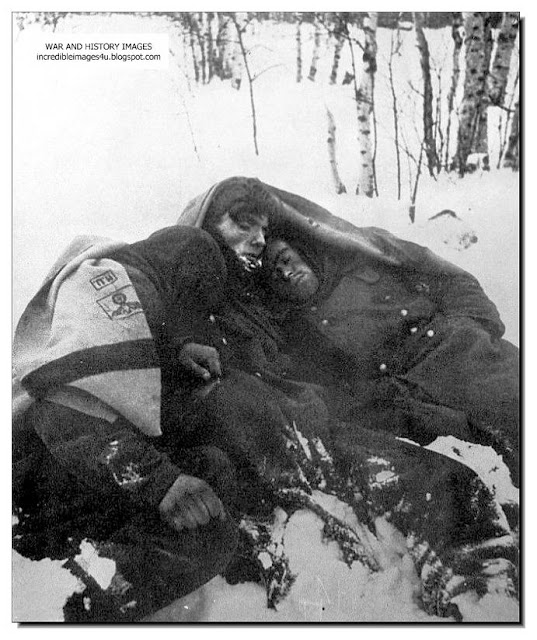
Some 3,500 civilians were put to work as burial parties. They stacked frozen German corpses like piles of timber at the roadside, and although they had a few carts drawn by camels, most of the removal work was accomplished with improvised sleds and handcarts. The German dead were taken to bunkers, or the huge anti-tank ditch, dug the previous summer, and tipped in. Later,1,200 German prisoners were put to work on the same task, using carts, with humans instead of horses pulling them. 'Almost all members of these work parties', reported a prisoner of war, 'soon died of typhus.' Others - 'dozens each day' according to an NKVD officer in Beketovka camp — were shot on the way to work by their escorts.

Of the 91,000 taken prisoner at the end of the battle, almost half had died by the time spring arrived. The Red Army itself acknowledged in subsequent reports that orders for the care of pris- oners had been ignored, and it is impossible to tell how many Germans were shot out of hand during or soon after their surrender, often as vengeance for the deaths of relatives or comrades.
With the war over in Stalingrad, Russian people come back home
RELATED
-------------------------------------
STALINGRAD: A FATEFUL SIEGE
Antony Beevor
STALINGRAD Antony Beevor
-----------------------------------------
HISTORY BOOKS
JONATHAN BASTABLE
The best story was of a Russian commander holding out with his men in a factory. They were almost out of ammo and had bricks to throw at the enemy. For some reason the Russian commanders had given them up for dead so to get their comrades attention and to let them know they were alive they needed a red flag to let hang from the building. They had nothing but a bloody vest from a wounded comrade to use! The whole story of their survival in the building outnumbered with no ammunition is AMAZING!
SUGGESTED READING


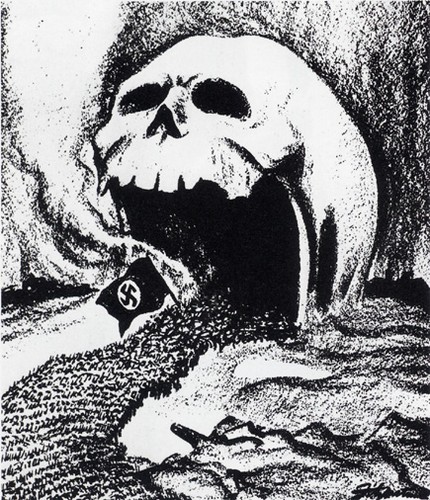























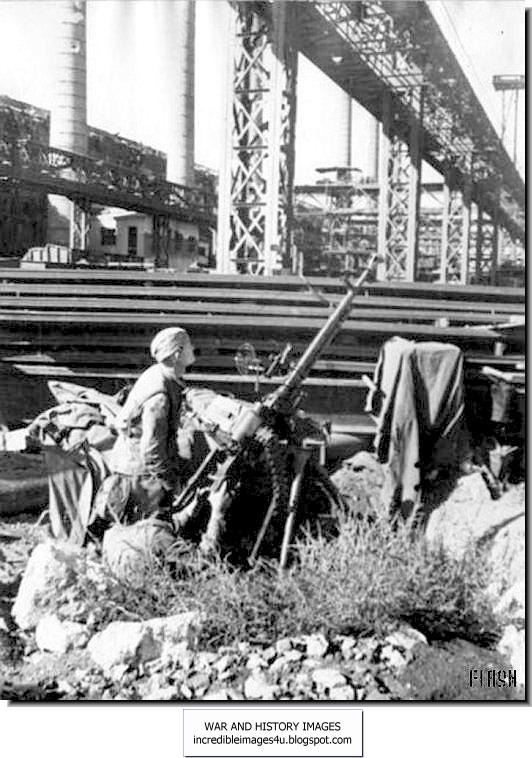
































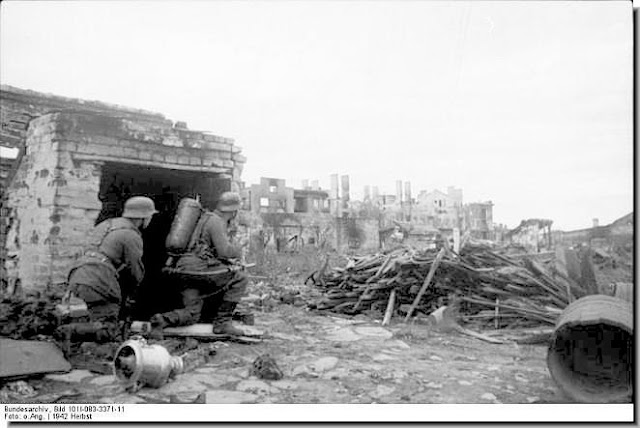





















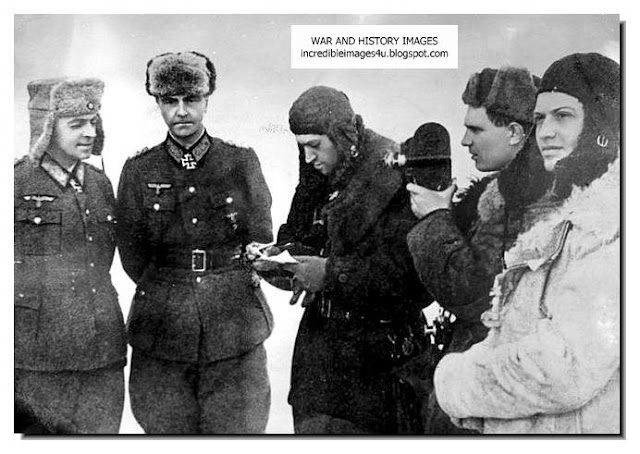
























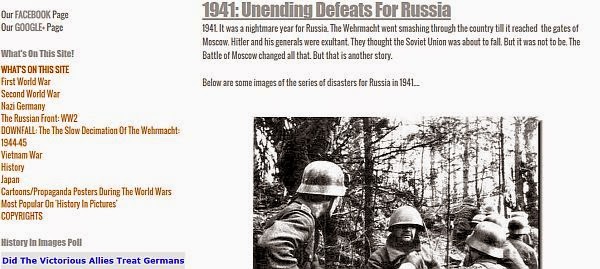
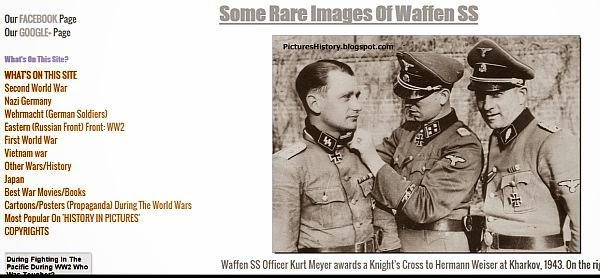
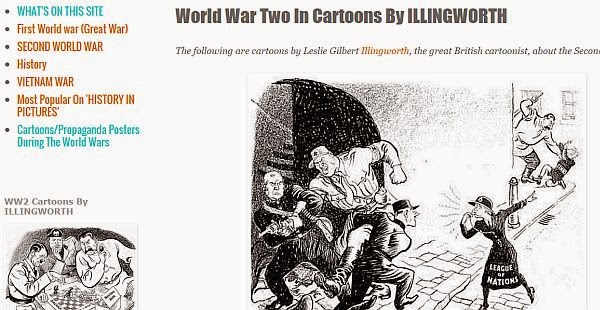
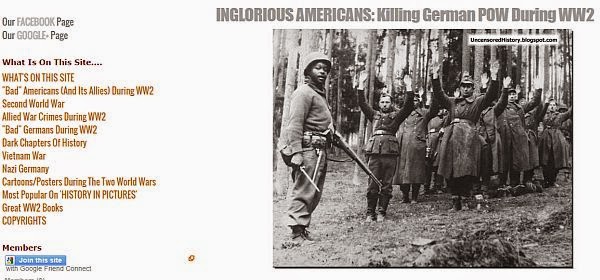
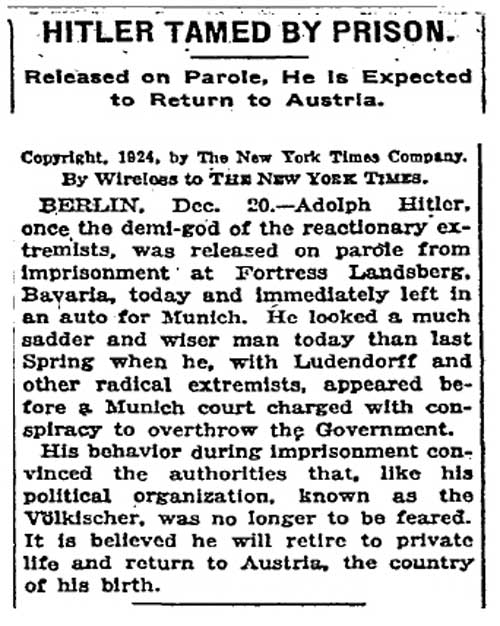
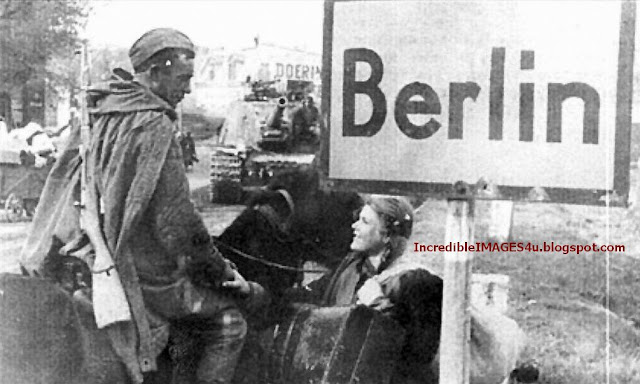






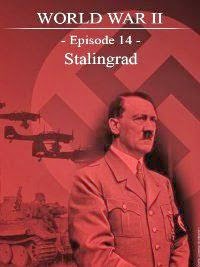
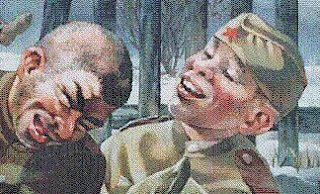
0 Comments:
Post a Comment